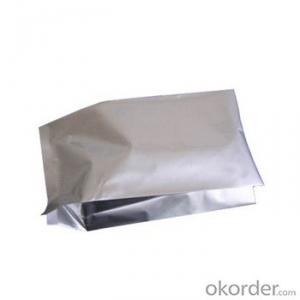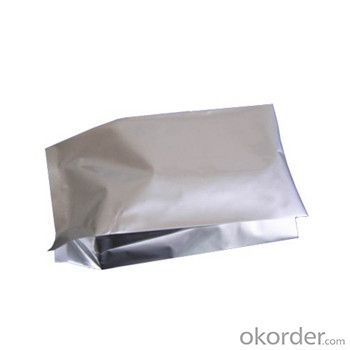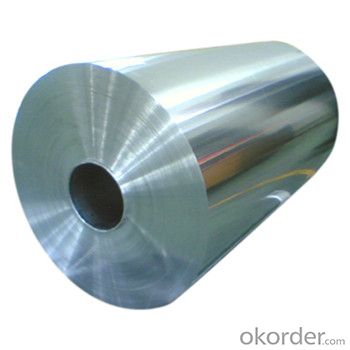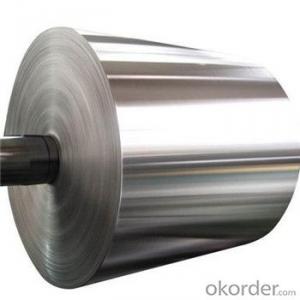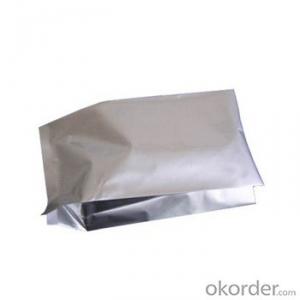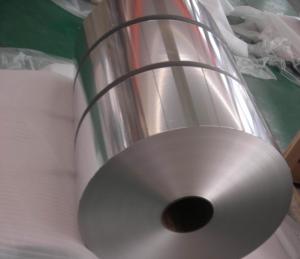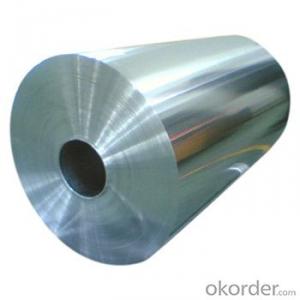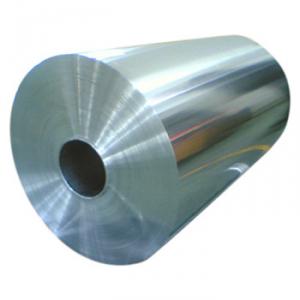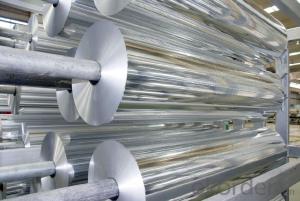Aluminum Coil Anodizing Corp's Aluminium Jumbo Foil for Flexible Packaging Application
- Loading Port:
- China main port
- Payment Terms:
- TT OR LC
- Min Order Qty:
- 3 m.t
- Supply Capability:
- 10000 m.t/month
OKorder Service Pledge
OKorder Financial Service
You Might Also Like
Specification
1. Description of Aluminium Jumbo Foil For Flexible Packaging Application
Aluminum foil aluminum alloy :1235 /8011/8079
Aluminum foil width and length :according to your request
Aluminum foil Core ID :76.2mm &152mm
Aluminum foil temper : o /h12 / h24
Final usage: insulation aluminum foil / lidding aluminum foil /tag and lable aluminum foil / container aluminum foil / food and pharmaceutical packing foil / cigarette aluminum foil
2. Specifications of Aluminium Jumbo Foil For Flexible Packaging Application
Product | Alloy | Thickness | Width | ID mm | Remark |
| Cable wrap foil | 1235/8011-O | 0.2-2.0mm | 60-1700mm | 76 152 200 300 400 500 | Accept customization |
| Bottle cap foil | 8011-H14/H16 | ||||
| Household foil | 1235/8011-O | 0.005-0.2mm | 100-1700mm | ||
| Container foil | 3003-H24/ 8011-H24 | ||||
| Flexible packingfoil | 1100/1235/8011-O | ||||
| Lable foil | 8011-O |
3. Feature of Aluminium Jumbo Foil For Flexible Packaging Application
*Such coil is specially designed to replace aluminum ingot, due to the high export tax of aluminum ingot, the coil has better price than ingot.
*This type of coil can fit customer's remelting furnace just like ingot, no need to make any change to the production line that was previously used for ingot. The standard coil size and weight is very suitable for the feed gate of furnace.
*This type of coil causes less material wastage than ingot when remelted.
*Our coil is made directly from ore, no need to go though the ingot making process, quality is much better than other suppliers who use ingot scrap to make coil.
Be free from Oil Stain, Dent, Inclusion, Scratches, Stain, Oxide Dicoloration, Breaks, Corrosion, Roll Marks, Dirt Streaks and other defect which will interfere with use
4. Certificate:
SGS and ROHS(if client request, paid by client), MTC(plant provided), Certificate of Origin(FORM A, FORM E, CO), Bureau Veritas and SGS (if client request, paid by client), CIQS certificate
5. Image of Aluminium Jumbo Foil For Flexible Packaging Application
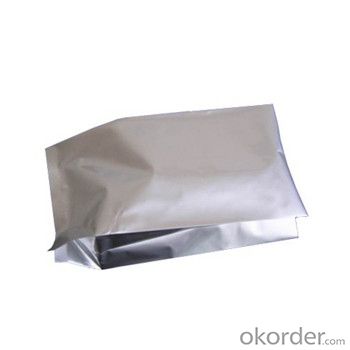
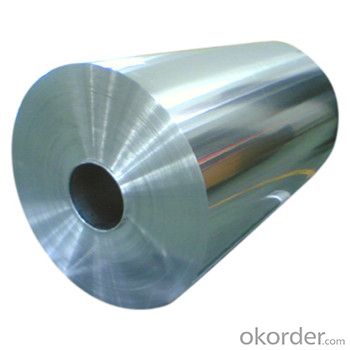
6. Package and shipping of Aluminium Jumbo Foil For Flexible Packaging Application
eye to sky
eye to wall
with wooden pallet (wooden case also available)
7. FAQ
1) What is the delivery time?
Dpends on actual order, around 20 days
2) What is the QC system:
We have QC staff of 20 persons and advanced equipment, each production is with MTC traced from Aluminum ingot lot.
3) What market do you mainly sell to?
Australia, America, Asia, Middle East, Western Europe, Africa etc
- Q: How do aluminum coils contribute to energy-efficient lighting?
- Aluminum coils contribute to energy-efficient lighting by serving as the primary material for heat sinks in LED light bulbs. These heat sinks are essential in dissipating the excess heat generated by the LED chips, thereby preventing overheating and ensuring optimal performance, longevity, and efficiency of the lighting system.
- Q: Is it possible to use aluminum coils as a material for crafting jewelry?
- <p>Yes, aluminum coils can be used to make jewelry. Aluminum is a lightweight, durable, and affordable metal that is often used in costume jewelry and art pieces. It's easy to work with, allowing for intricate designs and shapes. However, it's important to note that aluminum is not as valuable or as resistant to tarnishing as precious metals like gold or silver, so it may not be suitable for high-end or long-lasting jewelry pieces.</p>
- Q: What are the different tempers available for aluminum coils?
- The different tempers available for aluminum coils include annealed, full hard, half hard, and quarter hard.
- Q: Can aluminum coils withstand high temperatures?
- Yes, aluminum coils can withstand high temperatures. Aluminum has a relatively high melting point of approximately 660 degrees Celsius (1220 degrees Fahrenheit). This makes it suitable for applications that involve high-temperature environments. Additionally, aluminum has excellent thermal conductivity, which allows it to dissipate heat efficiently. This property makes aluminum coils commonly used in heat exchangers and various heating applications. However, it is important to note that the specific temperature limit for aluminum coils may vary depending on the specific alloy and application.
- Q: How many companies have used aluminum coil?
- Too many. All the companies who make the aluminum products you have seen in daily life have used it. So it is hard to explain.
- Q: What are the dimensions of an aluminum coil?
- The dimensions of an aluminum coil can vary depending on the specific application and manufacturer. However, common dimensions for aluminum coils range from 0.15mm to 8mm in thickness, and from 20mm to 2000mm in width. The length of an aluminum coil can be customized to meet specific requirements.
- Q: Are aluminum coils suitable for heat sinks?
- Indeed, aluminum coils are well-suited for heat sinks. The reason for aluminum's popularity in this regard lies in its exceptional thermal conductivity and affordability. Its remarkable thermal conductivity permits efficient heat transfer from a heat source to the heat sink's fins, which effectively dissipate the heat into the surrounding environment. Moreover, aluminum possesses the advantageous qualities of being lightweight and easily moldable into different shapes, thereby rendering it a versatile material for heat sink purposes. All in all, aluminum coils prove to be a fitting option for heat sinks due to their ability to effectively dissipate heat and their cost-effectiveness.
- Q: How do you store and transport aluminum coils?
- To ensure the safety and prevent damage of aluminum coils, various methods are typically employed for their storage and transportation. When it comes to storage, it is crucial to keep the coils in a dry, clean, and well-ventilated area, thereby avoiding any moisture-related problems or corrosion. It is also ideal to maintain a controlled temperature in the storage area to prevent any drastic fluctuations that could impact the quality of the aluminum. In order to safeguard the coils from physical harm, they should be stored horizontally or vertically on a stable and level surface. It is important to avoid excessive stacking, as this could lead to potential collapse and hinder easy access for inspection or transportation purposes. Additionally, placing the coils on wooden pallets or racks with appropriate spacing between each coil can offer additional stability and protection. When it comes to transporting aluminum coils, the options available depend on factors such as quantity, distance, and mode of transportation. For short distances or smaller quantities, hand trucks or forklifts can be utilized to move the coils onto a flatbed truck or van. It is crucial to properly secure the coils using straps or bands to prevent any movement during transit. For larger quantities or longer distances, specialized coil carriers can be employed for transportation. These carriers are specifically designed to securely hold multiple coils in an organized manner, thereby minimizing any potential damage caused by vibration or shifting during transportation. They typically feature side rails and restraining bars to ensure the coils remain secure. Irrespective of the chosen transportation method, it is vital to handle the aluminum coils with care and ensure they are adequately protected. Regular inspections should be conducted before, during, and after transportation to identify any signs of damage or issues that could compromise the integrity of the coils. By adhering to these guidelines, the storage and transportation of aluminum coils can be carried out efficiently and safely.
- Q: Are there any fire safety considerations when using aluminum coils?
- Yes, there are fire safety considerations when using aluminum coils. Aluminum is a highly flammable material, and if not handled and installed properly, it can pose a fire risk. It is important to ensure that the aluminum coils are installed in a way that minimizes the risk of fire, such as using proper insulation and avoiding direct contact with other flammable materials. Additionally, regular maintenance and inspections should be conducted to identify any potential issues or signs of overheating that could lead to a fire. Following fire safety protocols and guidelines, such as having a fire extinguisher nearby and ensuring proper ventilation, can also help mitigate the fire risk associated with using aluminum coils.
- Q: This question asks for the cost of a set of aluminum coils.
- <p>The cost of a set of aluminum coils can vary significantly based on factors such as the current market price of aluminum, the size and thickness of the coils, and the quantity being purchased. As of my last update, the price of aluminum fluctuates with the global commodities market, and it's best to check with suppliers or on metal exchange platforms for the most accurate and up-to-date pricing. For specific projects, you might need to contact aluminum suppliers directly to get a quote tailored to your requirements.</p>
Send your message to us
Aluminum Coil Anodizing Corp's Aluminium Jumbo Foil for Flexible Packaging Application
- Loading Port:
- China main port
- Payment Terms:
- TT OR LC
- Min Order Qty:
- 3 m.t
- Supply Capability:
- 10000 m.t/month
OKorder Service Pledge
OKorder Financial Service
Similar products
Hot products
Hot Searches
Related keywords
